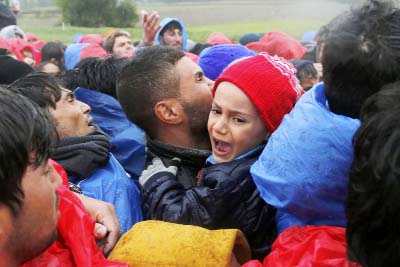
Reuters, Rigonce :
A huge inflow of migrants and refugees to Slovenia continued on Saturday as thousands of people arrived to the tiny Alpine state on their way to Austria and Germany.
Since last Saturday 58,000 migrants, many fleeing the war in Syria, have arrived in Slovenia, shifting their route to the west after Hungary sealed off its borders.
As a percentage of Slovenia’s tiny population that is the equivalent of almost 2.3 million people entering Germany or 1.8 million arriving in Britain in a week.
Police said about 9,000 migrants were still in Slovenia on Saturday with more on the way.
“We want to go to the Netherlands. I just want this ordeal to stop. There is no way back and I am ready to do anything to secure a future to my son,” said 20-year-old Hamrein from Syria, holding her feverish 6-month-old son against her chest.
She was one of about 2,000 migrants who were waiting in a muddy field near the Slovenian village of Rigonce to cross to nearby migrant camp, braving cold and foggy weather.
Many put up fires and wrapped themselves into blankets and aluminum foil to try to keep warm with morning temperatures being close to zero.
They hope to be able to reach Austria later on Saturday but many more are behind them with about 8,500 migrants entering Serbia over the past 24 hour in order to continue their way to Croatia, Slovenia and then Austria.
Serbia, Bulgaria and Romania said on Saturday they would close their borders if Germany would do so, so as to prevent the Balkans becoming a buffer zone for stranded migrants.
Slovenia had said on Friday it would consider putting up a fence on its border with Croatia unless a solution is found at a Sunday meeting of regional heads of states with European Commission President Jean-Claude Juncker.
Croatia has so far insisted that walls or fences are not the solution, but rather a common EU approach tackling the situation on the border between Greece and Turkey, where most migrants and refugees enter the EU.
“We will not just sit idle watching how the others are building fences around us,” Croatian Prime Minister Zoran Milanovic said.
Some 230,000 migrants have passed through Croatia since mid-September.
Juncker has invited the heads of Austria, Bulgaria, Croatia, Macedonia, Germany, Greece, Hungary, Romania, Serbia and Slovenia to the meeting.
A huge inflow of migrants and refugees to Slovenia continued on Saturday as thousands of people arrived to the tiny Alpine state on their way to Austria and Germany.
Since last Saturday 58,000 migrants, many fleeing the war in Syria, have arrived in Slovenia, shifting their route to the west after Hungary sealed off its borders.
As a percentage of Slovenia’s tiny population that is the equivalent of almost 2.3 million people entering Germany or 1.8 million arriving in Britain in a week.
Police said about 9,000 migrants were still in Slovenia on Saturday with more on the way.
“We want to go to the Netherlands. I just want this ordeal to stop. There is no way back and I am ready to do anything to secure a future to my son,” said 20-year-old Hamrein from Syria, holding her feverish 6-month-old son against her chest.
She was one of about 2,000 migrants who were waiting in a muddy field near the Slovenian village of Rigonce to cross to nearby migrant camp, braving cold and foggy weather.
Many put up fires and wrapped themselves into blankets and aluminum foil to try to keep warm with morning temperatures being close to zero.
They hope to be able to reach Austria later on Saturday but many more are behind them with about 8,500 migrants entering Serbia over the past 24 hour in order to continue their way to Croatia, Slovenia and then Austria.
Serbia, Bulgaria and Romania said on Saturday they would close their borders if Germany would do so, so as to prevent the Balkans becoming a buffer zone for stranded migrants.
Slovenia had said on Friday it would consider putting up a fence on its border with Croatia unless a solution is found at a Sunday meeting of regional heads of states with European Commission President Jean-Claude Juncker.
Croatia has so far insisted that walls or fences are not the solution, but rather a common EU approach tackling the situation on the border between Greece and Turkey, where most migrants and refugees enter the EU.
“We will not just sit idle watching how the others are building fences around us,” Croatian Prime Minister Zoran Milanovic said.
Some 230,000 migrants have passed through Croatia since mid-September.
Juncker has invited the heads of Austria, Bulgaria, Croatia, Macedonia, Germany, Greece, Hungary, Romania, Serbia and Slovenia to the meeting.

